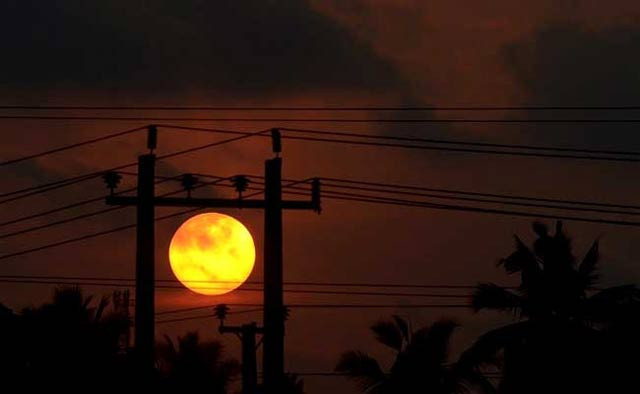Sindh, Punjab power consumers to pay extra Rs0.70 per unit
Govt will collect Rs156b to recover cost of laying the transmission line

Govt will collect Rs156b to recover cost of laying the transmission line. PHOTO: AFP
The estimated cost will be recovered from the consumers of state-owned power distribution companies, excluding the privatised K-Electric, over a period of 25 years, which will meet expenses of laying an 878-kilometre transmission line from Matiari, Sindh to Nankana Sahib district, Lahore.
Senate panel wants 17% GST removed on electricity bills
Of the total stretch of the transmission line, 550.65 km of power cables will be laid in Punjab and 314.9 km will be covered in Sindh.
It will be a 660-kilovolt high voltage direct current (HVDC) transmission line and help transmit 4,000 megawatts of electricity from the new coal-fired power plants at Port Qasim, Hub and Thar to northern Pakistan.
The government was seeking to collect Rs1.1 per unit to raise Rs200 billion, but the regulator after reviewing the statistics allowed Rs0.70 per unit, which would bring Rs156 billion.
However, the regulator clearly pointed out in the decision that the additional tariff would be applicable for 25 years only.
The National Transmission and Dispatch Company (NTDC) and the State Grid of China had signed a cooperation agreement in April 2015 for laying the Matiari-Lahore transmission line, which has been included among priority projects of the China-Pakistan Economic Corridor (CPEC).
Govt quietly collects Rs200b in power bills
The CPEC is a $46-billion project which includes execution
of massive power and infrastructure projects in Pakistan with
Chinese assistance.
The transmission line will carry about 660MW from Engro’s coal-fired power plants in Thar, 1,320MW from a mine-mouth power plant in Thar, 1,320MW from the Port Qasim power project, 660MW each from two coal-power plants in Hub and 330MW from Siddiqsons Energy.
According to the petition filed with Nepra, the NTDC had opted for the HVDC 660kv line for the transmission of bulk power based on feasibility and cost studies conducted by SNC-Lavalin of Canada in 2013.
Two converter stations in Matiari and Lahore will also be part of the project that will help it come in line with the existing transmission system.
Moreover, the project is associated with the power generation plants based on imported and local coal at lower costs, which will save billions of dollars annually that will otherwise be needed for the import of oil for electricity production.
This is the first private-sector transmission line project that will take 36 to 42 months for completion of work.
Published in The Express Tribune, August 20th, 2016.
Like Business on Facebook, follow @TribuneBiz on Twitter to stay informed and join in the conversation.



















COMMENTS
Comments are moderated and generally will be posted if they are on-topic and not abusive.
For more information, please see our Comments FAQ